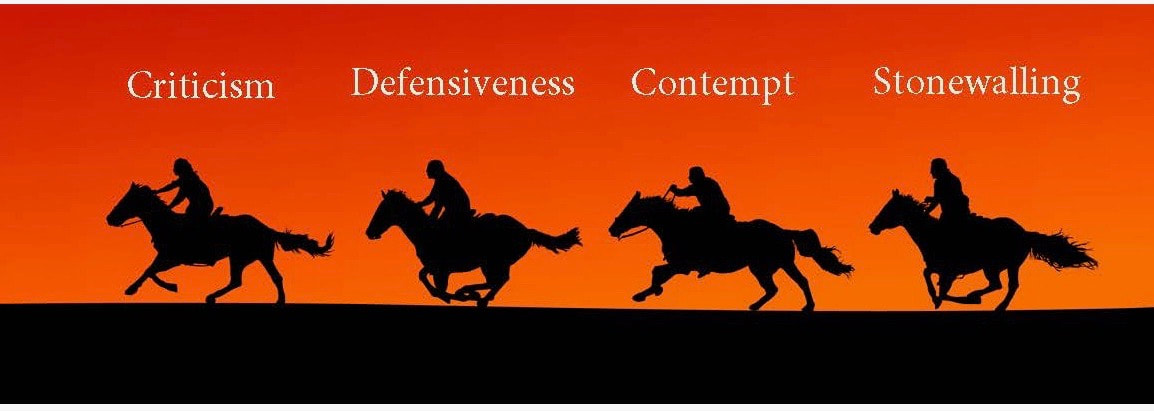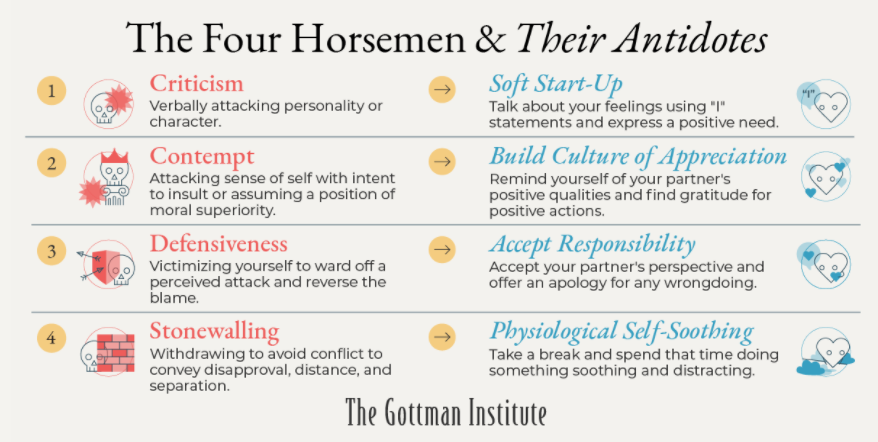|
NEWS FROM THE THERAPY ROOM. Tips and strategies that you can use in your own relationships. |
|
I hope you had a great Easter break. I've been working with some couples recently who have engaged in some behaviours that don't bode well for their relationship. All of these behaviours have a connection with respect (or lack thereof). They are quite damaging, and if they are allowed to persist, can be quite destructive for the relationship. And the weird thing is that people who do this stuff, are likely to do this only with their partners - they are unlikely to treat other people in their lives in this way. These four behaviours have been described by prominent couples researcher John Gottman, as The Four Horsemen of the Apocalypse, because of the damage they can bring. They are described below - the most damaging of these is number 2: Contempt, because it can be so cutting and hurtful. Read them below, and if you really do value your relationship, keep them away. If they have been sneaking in to your relationship and you are serious about now standing up to them (and even if you only have one or two of the Horsemen present), their antidotes are not super complex. And if you want to understand these better, check out John Gottman & Nan Silver's book: The Seven Principles for Making Marriage Work. Remember that the longer the Horsemen are allowed to gallop through your relationship, and the more of them that are present, the more fragile and damaged the relationship will become, to the point that it cannot be saved. So step up, keep those damned Horsemen at bay - there's too much at stake to allow them to settle in. And sure, maybe your partner is doing some of this stuff also - but that doesn't make it OK for you to do it too. If you need some help with keeping the Horsemen at bay, of if you want to look at the underlying issues that helped them get a foot in the door, please contact me. _____________________________________________________________________________________________________ Happy New Year - welcome to 2022. Do we all need a better year, which is not about COVID/COVID/COVID? I know I do..... If 2022 turns out to be even partially as challenging as 2021 was, people are likely to want to zero in on those parts of their lives that ARE fixable, such as their relationships. And when the wider world can be a scary, weird old place, we can actually manage it better when we are in close and connected relationships with those people who are important to us. But sometimes those important relationships need some outside help to get them back to a good place. I've been providing therapy for couples and families for many years now, and even though I'm pretty experienced at it, I still get a lot of satisfaction from seeing clients walk off with their relationships in much better shape. My fees are quite moderate in comparison to many other therapists around the traps - but it is still a commitment for clients, not only with regard to the financial outlay, but also the time out from work, or needing to find child care etc. So, like my clients, I want to see therapy work for them - and not just when they are in the midst of their issues - but for it still to be keeping them on track in 6 months time, and in 6 years time. I'm usually working pretty hard when I'm sitting with my clients - hearing about their challenges, looking at their communication styles, how they "do" conflict, how they manage emotions, and planning with them as to how they can do things differently for the future. By this stage of my career, I have seen what works. But most clients are coming to therapy for the first time, and won't necessarily know what to do, or how the whole process works. So if you are thinking about seeking some therapy for yourself in 2022, here are seven points that can help you make better use of the process. 1) Get ready to talk. What I'm meaning here is that therapy is a talking process, and it works better for you, if you get involved from the beginning. Your perspective is just as important as whoever else is attending with you on the day, and I need to hear everyone's take on things. Therapy does not work by sitting quietly in the chair, and hoping that just physically attending will be enough to fix things. People sometimes hold back for fear of saying "the wrong thing," or they are just uncomfortable about having to attend. So long as it is said respectfully, there is no wrong thing you can say. And your view is just as important as anyone else's in the room. 2) But don't talk too much. Sometimes people might talk a lot in therapy, because they are anxious. Or talk about events that are not really connected with what has brought them in the door, as a way to avoid talking about the real issues. These are understandable defence mechanisms, and I understand that it can be a bit scary to talk to a complete stranger (or sometimes, for that matter, to who you are attending with) about your very personal issues - but therapy works better for you if you can take a deep breath and focus on the real stuff. I'll be there to support you with it, whatever it is. 3) Try not to do too much blaming of whoever else you are attending therapy with. Maybe they are not the most ideal person in your life right now. But family conflicts or couples issues usually involve more than one person, so chances are you are a fairly equal stake-holder in what ever issues are present - so thinking about communication patterns between you and them, is more useful than just pointing the finger and expecting them to do all the changing. 4) Have some goals. Again, you'll be making better use of your time and money if you are clear on what you want to address by coming to therapy. 5) Remember that the real work occurs outside of the therapy room. Coming and talking with me is a useful thing to do, but it is just a small part of the change process. To make therapy really effective you'll be needing to think about what your take-aways are, and what you are going to do with them in the 'real world.' I'll talk with you more about this towards the end of each session. 6) Have some patience. Most people want to get in and out of therapy, as quickly as they can, and without it costing them a fortune, or without it being too disruptive, or drawn out. This makes sense, and I agree with this, and so I tend to work in a short-term way. But keep in mind that by the time people actually seek therapy, their issues have often been building for months, maybe even years - and so it can sometimes take several sessions before any substantial changes begin to emerge. 7) Be genuine about attending. In other words make sure you give therapy a good attempt, that you get involved in the process, rather than just going through the motions so that you could say later on that you gave it a shot. That's it - keep this stuff in mind, and therapy will be a lot more effective for you. Please contact me if you have any questions about any of this. Go well in 2022. COVID will probably continue to throw us some curved balls. So at least make sure your relationship is a safe haven for you. Hard to believe that I haven't written anything here since Easter, when in New Zealand, we were all in the thick of our COVID lockdown. I've been crazy busy since then - a lame excuse I know, because let's face it, everyone is busy, and many people have been extra stressed since COVID hit town.
Since our lockdown finished back in late May, I've been working with a lot of families and couples, where relationships have become stressful, or are simply no longer working for those involved. But the great thing with these folks is that they at least wanted to do something about it, hence why they sought some help. I'm always a bit stunned when I remind myself of one of John Gottman's research findings, that showed many people with relationship issues will often do nothing about this whatsoever for 6 years on average, and will just continue to tough it out instead, while things decline further. This is so unnecessary. One of the things that is obvious in therapy are the patterns that are often present in conflicts, and this is especially so for couples. I'm always intrigued with the directions in which conflicts can head - how they can blow up, get out of control, and leave people feeling wounded and distressed. And on top of all that, the actual issue that was the focus of it all in the first place, that was important enough that it needed to be raised, is then swamped and is lost, because once again, the conflict has become bigger than the issue. And many couples will do this time and time again - knowing all the while, from previous episodes, that it does not work, that it's distressing, and even hurtful. Human nature being what it is - when someone feels hurt, (because there has been yelling, or name calling, for instance), then they will want to then hurt back. It's a weird old human way of how we try and defend oursleves. And so it goes. Hurt people hurt people, and both wind up feeling distressed and emotionally distant from each other. So rather than get reduced yet again, to insulting each other, or being loud and demanding, when a conflict has arrived, what would happen instead, if one of the parties involved, stepped outside of the pattern, before the Bad Verbals had really kicked in, and (respectfully) said "wait a minute - are we doing that thing again?" Maybe this is a simplistic way of looking at conflict - and I know this does not necessarily resolve any underlying issues. But it does break an unhelpful pattern where people could otherwise wind up hurting each other. This in turn can then pave the way for looking at the issue differently, taking some of the heat out, and really hearing each other's perspectives. Talk soon. HAPPY EASTER - I hope you are enjoying the break, even if the days do not feel too different to any of the other days from the the last two weeks.
Here in New Zealand, we are two weeks into our lock-down, and have (hopefully) just two to go. Whether we like it or not, our worlds have become smaller, and potentially even simpler, and so maybe this is not all bad. One thing is for sure, we will all remember this weird old period in time, for the rest of our lives. The first couple of weeks have passed more quickly than I imagined they would - and for me being confined to home has not been so bad. I'm aware though, that for many it has felt challenging (even if they have remained free of physical symptoms of COVID19) and that this could increase further over the next couple of weeks. Some folks who live by themselves are starting to feel the isolation, and some family members and people from shared households are starting to get niggly with each other. So the big thing for all of us for the next couple of weeks is to be thinking about how we can each personally take charge of this. How do we not let COVID19 win? So if you are living with others, what will you do, from your end of things, to maintain a positive and relaxed vibe in the household? We all have a responsibility to think how each of us plays a part in ensuring that it's mostly smooth sailing over the coming weeks. We want to make it as manageable for ourselves as we can in the here and now.. But also as the years slip by, we need to be able look back on this strange time that was forced upon us, and know that we did the best with it that we could, and that we actually came out of it better connected with those people that matter to us.. There's no need to re-invent the wheel right now, as already there is so much useful info out there - So here are some links to some great articles. 1) There's a raft of useful resources for parents with younger kids, including some ways for helping to keep things calm at home over the next couple of weeks: Helping children and young people while they are learning at home | Education in New Zealand 2) From a completely different, yet equally important direction, there's some good stuff here from the Gottman Institute for helping couples to stay focused and keep connected during this challenging time: Redefining Individuality and Togetherness During Quarantine Good luck for the coming couple of weeks. With two weeks of lock-down already completed, hopefully we have now got this "family relationship stuff under pressure" nailed. We can do this. The trick is to keep it going and know for the future, that COVID did NOT win. Not only did COVID not make you physically sick, but it did not manage either, to turn you against the people who matter most to you. Kia Kaha PS: New Zealand has been experiencing a 20% increase in family violence since lock-down started. Forget COVID19, nothing will bring more enduring damage to a family than this. Talk soon.. |
"Some occasional thoughts about families, relationships, and other things that distract us...."
Categories
All
|
- This is not an emergency service. Information on these pages is not meant to take the place of input from a registered mental health professional in your community.
- For urgent or crisis mental health care in the Christchurch, New Zealand region, please call Freephone 0800-920-092 (24 hours x 7 days).
- Family Therapy Christchurch | Couples Therapy Christchurch | Couple Counselling | Relationship Counselling | Family Counselling Christchurch









 RSS Feed
RSS Feed